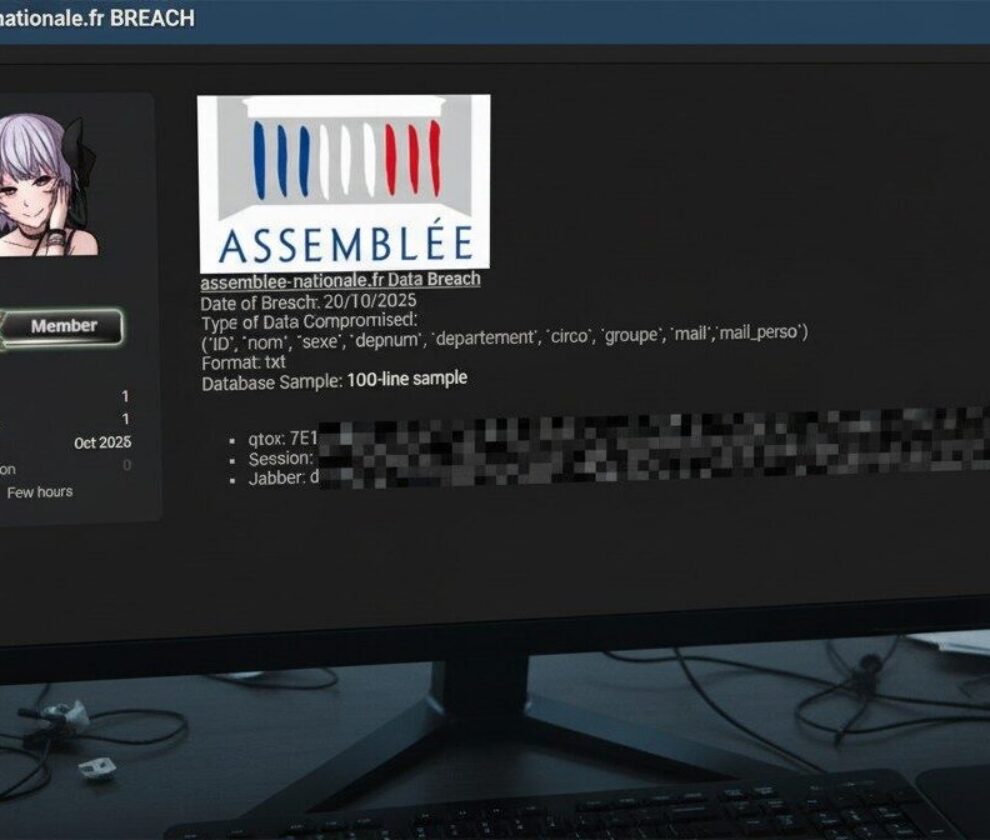The recent data breach at the French Assemblée Nationale has uncovered significant cybersecurity vulnerabilities, sending shockwaves throughout government institutions. This alarming revelation, first disclosed by a malicious actor on a dark web forum on October 20, 2025, exposes the pressing need for stronger protective measures in public sector IT systems.
A Closer Look at the Breach
Preliminary reports suggest that the exposed data contains both personal and professional details of individuals linked to the Assemblée Nationale. Sensitive information, such as full names, official and personal email addresses, gender, political group affiliations, departments, and voting constituencies, has been compromised. The scale of this breach is profoundly concerning given the potential misuse of such data.
The Fallout for Citizens and State Administration
The implications of this security lapse are far-reaching. From identity theft to coordinated disinformation campaigns, the risks are manifold. In today’s geopolitical climate, such breaches don’t merely compromise individuals’ privacy but strike at the heart of democratic institutions, potentially destabilizing public trust and governance efficiency.
Exposing Systemic Weak Points
This incident highlights glaring deficiencies in the cybersecurity measures of public sector organizations. The blending of professional and personal data—evident in the exposed private addresses alongside official details—further amplifies the issue. Proper segmentation of sensitive data is a baseline practice that was evidently overlooked, leaving room for exploitation during this breach.
Essential Defenses to Fortify Cybersecurity
In light of such cyberattacks, it is imperative for France to bolster its cybersecurity infrastructure. Key measures should include:
- Conducting comprehensive and regular security audits to identify vulnerabilities.
- Enhancing cybersecurity training across all levels of governmental staff, from administrative workers to higher-ranking officials.
- Implementing automated data leakage detection tools for faster identification and response to breaches.
Investing in Advanced Security Solutions
Experts advocate for the adoption of cutting-edge technologies to mitigate future risks. Multi-factor authentication (MFA), for example, adds an essential layer of protection against unauthorized access. Similarly, leveraging artificial intelligence and machine learning can help identify unusual activity patterns, enabling proactive responses to potential threats.
The Role of Transparency in Crisis Management
Transparency is vital when addressing a data breach of this magnitude. Institutions must promptly notify affected parties, provide clear communication about the scope of the intrusion, and outline the steps being taken to mitigate further damage. Proactive crisis management fosters public trust and demonstrates accountability during challenging times.
European Cooperation: A Collective Defense
Given the transnational nature of cyberthreats, collaboration within the European Union is more critical than ever. Joint initiatives, such as shared research efforts and cross-border threat intelligence sharing, can significantly enhance the continent’s cybersecurity defenses. By pooling resources and expertise, European nations can create a more robust framework to fend off malicious actors.
Conclusion: A Wake-Up Call for the Future
The data breach at the Assemblée Nationale serves as a stark reminder of the urgent need to prioritize cybersecurity at both national and international levels. Policymakers and administrators must view this incident as an opportunity to fortify preventive measures and foster a culture of digital resilience.
At Lynx Intel, we specialize in conducting strategic cybersecurity audits and offering tailored solutions to minimize the risk of such incidents. Protect your organization’s data and maintain stakeholder trust by contacting us today. Together, we can strengthen your defenses and secure a safer digital future.


